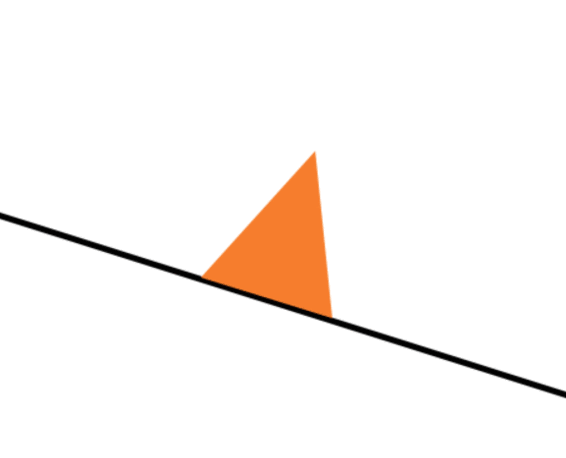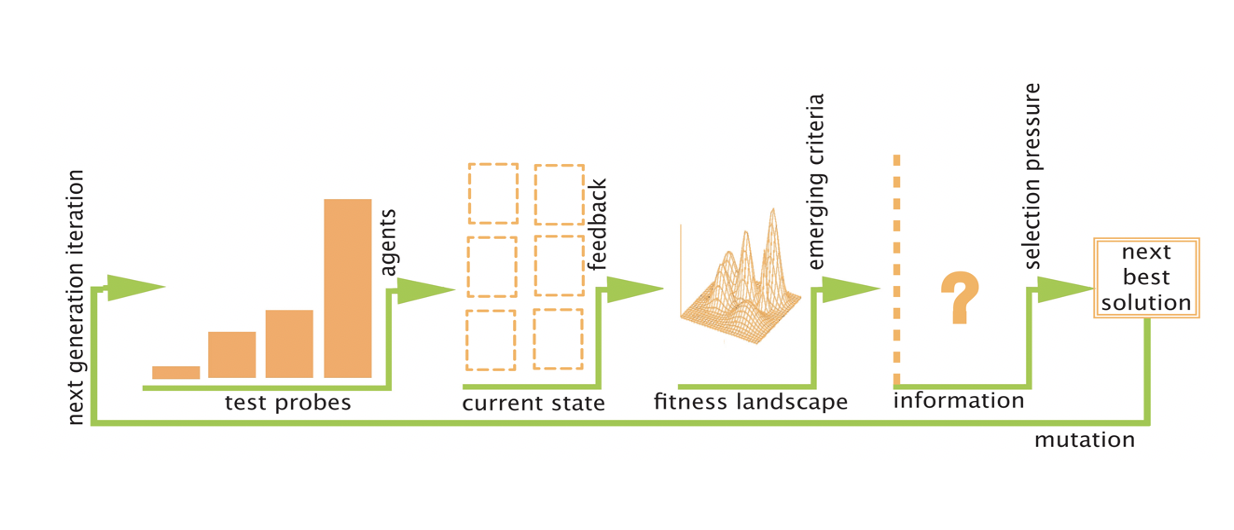cas/definition/feature.php (core concept)

Iterations
CAS systems unfold over time, with agents continuously adjusting behaviors in response to feedback. Each iteration moves the system towards more coordinated, complex behaviors.
The concept of interactive, incremental shifts in a system might seem innocent - but with enough agents and enough increments we are able to tap into something incredibly powerful. Evolutionary change proceeds in incremental steps - and with enough of these steps, accompanied by feedback at each step, we can achieve fit outcomes. Any strategies for increasing the frequency of these iterations will further drive the effectiveness of this iterative search.
One of the keys to enabling complex adaptation to manifest in a given system is the ability for these systems to unfold, with system complexity or fitness being enhanced with each ensuing step.
That said, the kinds of outcomes we see being derived from iterative unfolding differ somewhat in kind: some iterative processes lead to 'fitness' with respect to a given context, whereas other kinds of iterative processes generate pattern, but not necessarily fitness as the term would more generally be understood. Whether or not patterns might fulfill some other kind of fitness criteria is a more nebulous question, which we will get into later.
Differences and Repetitions
Prior to that, let us first clarify what we mean by an iteration. We can think of an iteration in two distinct ways: the first involving sequential iterations, and the second involving parallel iterations. Thus we can imagine a system that unfolds over the course of 100 generations, or we can imagine a system that has 100 components. Each generation can undergo a mutation, testing a different strategy of performance, or, in the case of the simultaneous system, each component of the system can have a slightly different performance strategy. Thus, while we tend to think of iterations as sequential 'versions' of a class of elements, in essence we can also have multiple 'versions' that operate in parallel rather than sequentially. If we recall the example of ants searching for food, we have many ants performing search in parallel - many iterations of ant behavior proceeding simultaneously.
That said the notion of sequence is important, because it implies the possibility of feedback: that each version of action can be assessed, and undergo a modification at every time step based on feedback: has a particular strategy moved closer to or further from a goal?
Example
Lets start with 100 ants and give them 10 seconds to scurry around a table where we have placed one tasty peanut butter sandwich. Let's say only one ant finds this big cache of food on the first go - Victory! This particular food locating strategy played out successfully for this particular ant in what we can call 'Version 1.0': What now needs to propagate through the colony as a whole is how to repeat this success - and this is where feedback enters into the picture. As part of Version 1.0 the victorious ant has gleefully deposited a bunch of pheromone traces enroute to the cache. "Version 2.0" has a couple of ants pick up on that trail, find the food, and pump up the pheromone signal, and so forth: through an iterative sequence of time steps - seeking, finding, and signaling - more and more ants are drawn to the yummy sandwich.
It is worth noting that even in round one, all ants had equal capacity to find food - the fact that one versus another ant was successful was effectively random. Thus what needed to propagate through the system was not some unique new superpower that this particular ant had (like some extra peanut butter receptors), but instead what needed to be replicated was the way in which the ants random search strategies were directed.
We can think of other examples of sequential iterations where the dynamics differ slightly in terms of what is being iterated. For example, we can state that the pathway from the first PC to today's smartphone was one that also proceeded by iteration, but the feedback driving each iteration entailed incremental system enhancements - a step by step learning from the previous model, (feedback), and then adjustments and improvements in the next round.
There is thus a subtle difference between iterations that involve feedback that is generative in terms of modifying or enhancing the inherent nature of the agents in the system and feedback that is more about propagating a behavior that is already available to all the agents in the system (but only randomly enacted by some and not other agents).
Many of the dynamics observed in complex systems have more to do with the iterative propagation of a particular behavioral regime. One form of propagation dynamics involves relaying a particular strategy that helps deliver a given resource or energy source to the group as a whole (patterns emerging that help direct slime mould or ants to viable food sources). Another propagation strategy involves driving a system towards regimes that minimize frictions or energy expenditures the system is encountering: water molecules coalescing into movement patterns that reduce internal drag differentials (generated by processing heat in Benard Rolls), metronomes synching so as to minimize movement frictions produced by their differentials).
With each iteration of these systems, the overall performance gets just a little bit better: energy sources that fuel a group become easier to find and access, and energy expenditures demanded of a group (due to the forces imposed by an external driver) are modified so as to process these drives in a more frictionless, smooth manner. In both cases we can think of the system as trying to enter into regimes that minimize global effort
Iterations for Fitness:
If a system can exist in many different kinds of states, with some states being more 'fit' than others, it is helpful if that system has an opportunity to explore different state possibilities. The faster it can explore the possibilities, the more likely it is to chance upon a state that is more productive or useful than another. This is why it is useful if a complex system has either a lot of agents, a lot of generations of agents, or both.
If we imagine a complex system as being capable of existing in many different kinds of states, than we can think of iterations as ways in which this Phase Space of system possibilities is explored. It is therefore useful to think about whether a given group of agents in a system is being offered enough iterative capacity to explore this phase space quickly enough to learn anything of use. An ant colony of only 10 ants might do a very poor job of finding food - exhausting itself to death before it succeeds in finding nourishment. In principle, nothing is wrong with the ants (agents), the driving flows (food), or the signaling (pheromones). There is simply not enough system iterative capacity to learn.
Iterations for Pattern
Fractals:
The examples described above pertain to how iterations combined with feedback can steer a system towards effective behavior. But there is another way in which iterations are explored, in terms of their capacity to produce emergent pattern through simple step by step rules.
Here we would describe the nature of Fractals generations, and how only a few rule steps, repeated over and over, can generate complex form that might be described as "emergent". Fractals like the Koch Curve or Serpinski Triangle are generated by simple geometric steps, (which we can call iterations) and more complex fractals like the Mandelbrot set can be created by creating a simple formulae that proceeds in recursive steps.
While these processes are iterative, and the patterns produced are emergent in that their spectacular aesthetic and harmonious qualities are not self-evident from their generative rules, these kinds of phenomena can not be seen to be 'learning' or becoming more 'fit' in the same way as described above.
Automata
Similar in terms of pattern generation, Conway's Game of Life (see Rules) is a prime example of complexity generated by such simple rules, that, repeated over multiple time step iterations yields highly complex behaviors.
Returning to the question of fitness and learning, this famous example of emergent complexity is entitle 'the game of life', but is it really life? While the emergent outcomes of the automata are rich in variety, can we say that the system adapts or learns, or becomes more fit? One feature of the output is that some of the 'creatures' generated in the game are able to enter into iterative loops, meaning that once these forms emerge they continuously reproduce versions of themselves. If proliferation within the grid of the game is thus considered to be a form of higher evolution (or Fitness), then perhaps this could be seen as a form of learning. That said, the Game of Life does not seem to 'learn' in ways we would associate with the word.

Game of Life from Wikimedia Commons
Explorations
Returning to notions of fitness in the more traditional sense, it is helpful to think of iterations as the way in which a complex system explores the scope of possibility within a Fitness Landscape. As described in more detail elsewhere, a fitness landscape represents the differential structure of possibilities within a space of all possible behaviors Phase Space, where more successful strategies within that space of possibility are conceptualized as peaks. Agent iterations can then be seen as processes of stepping around the fitness landscape, testing to see which steps take us up to higher peaks. In terms of these exploratory journeys, some agents may choose to incrementally modify whatever strategy they initially stumble upon (making small modifications and testing to see whether or not those modifications moved them higher or lower), and other strategies involve a more random 'jumping': abandoning a given set of strategies to test an altogether different set of alternatives. These jumps can be productive if they land agents on what are fundamentally higher peaks. These dynamics are unpacked in more detail on the pages referenced, but what is important to note is that the size of a step (or iteration), can vary between small local steps, and big global jumps.
Cite this page:
Wohl, S. (2022, 3 June). Iterations. Retrieved from https://kapalicarsi.wittmeyer.io/definition/timeiterations
Iterations was updated June 3rd, 2022.
Nothing over here yet
This is the feed, a series of related links and resources. Add a link to the feed →
Nothing in the feed...yet.
This is a list of People that Iterations is related to.
Cellular Automata
Wolfram was an early and prolific contributor to developing an understanding cellular automata
Learn more →Predator Prey Models
Logistic Function Learn more →Cellular Automata | Sugarscape
This is a default subtitle for this page. Learn more →Cellular Automata/Game Theory
This is a default subtitle for this page. Learn more →Game of Life
This is a default subtitle for this page. Learn more →Cellular Automata
Chris Langton is a research and computer scientist. His research interests include artificial life, complex adaptive systems, distributed dynamical systems, multi-agent systems, simulation technology, and the role of information in physics.
Learn more →Evolution
This is a default subtitle for this page. Learn more →This is a list of Terms that Iterations is related to.
For a system to adapt, it needs to have variables to adjust.
See also: Requisite Variety
Learn more →Related to the idea of Iterations that accumulate over time
More to come! Learn more →CAS Systems develop order or pattern ‘for free’: this means that order arises as a result of independent agent behaviors, without need for other inputs.
Text in progress Learn more →A notion that describes the ability of an intervention to quickly test whether or not it is 'fit', without expending unnecessary energy
Relates to {{tactical-urbanism}} Learn more →The quantity and breadth of a system's adaptive potential is its 'requisite variety'.
In order for a complex system to adapt, it needs to contain agents that have the capacity to behave in different ways - to enact adaptation you need adaptable things. Learn more →Agents in the CAS constantly adjust their possible behaviors to inputs - maintaining fitness over time.
CAS systems evolve over the course of time.

Learn more →
Cybernetics is the study of systems that self-regulate: Adjusting their own performance to keep aligned with a pre-determined outcome, using processes of negative-feedback to help self-correct.
The word Cybernetics comes from the Greek 'Kybernetes', meaning 'steersman' or 'oarsman'. It is the etymological root of the English 'Governor'. Cybernetics is related to an interest in dynamics that lead to internal rather than external governing.
Learn more →
The notion of 'Affordances' was developed by James Gibson. It has many strong similarities to the concept of 'phase space'.
Relates to how {{Landscape-Urbanism}} positions complexity thinking Learn more →This is a list of Urban Fields that Iterations is related to.
Cellular Automata & Agent-Based Models offer city simulations whose behaviors we learn from. What are the strengths & weaknesses of this mode of engaging urban complexity?
There is a large body of research that employs computational techniques - in particular agent based modeling (ABM) and cellular automata (CA) to understand complex urban dynamics. This strategy looks at how rule based systems yield emergent structures.
Many cities around the world self-build without top-down control. What do these processes have in common with complexity?
Cities around the world are growing without the capacity for top-down control. Informal urbanism is an example of bottom-up processes that shape the city. Can these processes be harnessed in ways that make them more effective and productive?
Landscape Urbanists are interested in adaptation, processes, and flows: with their work often drawing from the lexicon of complexity sciences.
A large body of contemporary landscape design thinking tries to understand how designs can be less about making things, and more about stewarding processes that create a 'fit' between the intervention and the context. Landscape Urbanists advancing these techniques draw concepts and vocabulary from complex adaptive systems theory.
Cities traditionally evolved over time, shifting to meet user needs. How might complexity theory help us emulate such processes to generate 'fit' cities?
This branch of Urban Thinking consider how the nature of the morphologic characteristics of the built environment factors into its ability to evolve over time. Here, we study the ways in which the built fabric can be designed to support incremental evolution
This is a list of Key Concepts that Iterations is related to.
Feedback loops occur in system where an environmental input guides system behavior, but the system behavior (the output), in turn alters the environmental context.
This coupling between input affecting output - thereby affecting input - creates unique dynamics and interdependencies between the two.
Learn more →Cybernetics is the study of systems that self-regulate: Adjusting their own performance to keep aligned with a pre-determined outcome, using processes of negative-feedback to help self-correct.
The word Cybernetics comes from the Greek 'Kybernetes', meaning 'steersman' or 'oarsman'. It is the etymological root of the English 'Governor'. Cybernetics is related to an interest in dynamics that lead to internal rather than external governing.
Learn more →
Navigating Complexity © 2015-2025 Sharon Wohl, all rights reserved. Developed by Sean Wittmeyer
Sign In (SSO) | Sign In
Related (this page): Urban Modeling (11), Urban Informalities (16), Tutorials (53), Feedback (88), Cybernetics (53),
Section: concepts
Non-Linearity Related (same section): Tipping Points (218, concepts), Path Dependency (93, concepts), Far From Equilibrium (212, concepts), Related (all): Urban Modeling (11, fields), Resilient Urbanism (14, fields), Relational Geography (19, fields), Landscape Urbanism (15, fields), Evolutionary Geography (12, fields), Communicative Planning (18, fields), Assemblage Geography (20, fields),
Nested Orders Related (same section): Self-Organized Criticality (64, concepts), Scale-Free (217, concepts), Power Laws (66, concepts), Related (all): Urban Modeling (11, fields), Urban Informalities (16, fields), Resilient Urbanism (14, fields),
Emergence Related (same section): Self-Organization (214, concepts), Fitness (59, concepts), Attractor States (72, concepts), Related (all): Urban Modeling (11, fields), Urban Informalities (16, fields), Urban Datascapes (28, fields), Incremental Urbanism (13, fields), Evolutionary Geography (12, fields), Communicative Planning (18, fields), Assemblage Geography (20, fields),
Driving Flows Related (same section): Open / Dissipative (84, concepts), Networks (75, concepts), Information (73, concepts), Related (all): Urban Datascapes (28, fields), Tactical Urbanism (17, fields), Relational Geography (19, fields), Parametric Urbanism (10, fields), Landscape Urbanism (15, fields), Evolutionary Geography (12, fields), Communicative Planning (18, fields), Assemblage Geography (20, fields),
Bottom-up Agents Related (same section): Rules (213, concepts), Iterations (56, concepts), Related (all): Urban Modeling (11, fields), Urban Informalities (16, fields), Resilient Urbanism (14, fields), Parametric Urbanism (10, fields), Incremental Urbanism (13, fields), Evolutionary Geography (12, fields), Communicative Planning (18, fields),
Adaptive Capacity Related (same section): Feedback (88, concepts), Degrees of Freedom (78, concepts), Related (all): Urban Modeling (11, fields), Urban Informalities (16, fields), Tactical Urbanism (17, fields), Parametric Urbanism (10, fields), Landscape Urbanism (15, fields), Incremental Urbanism (13, fields), Evolutionary Geography (12, fields),
